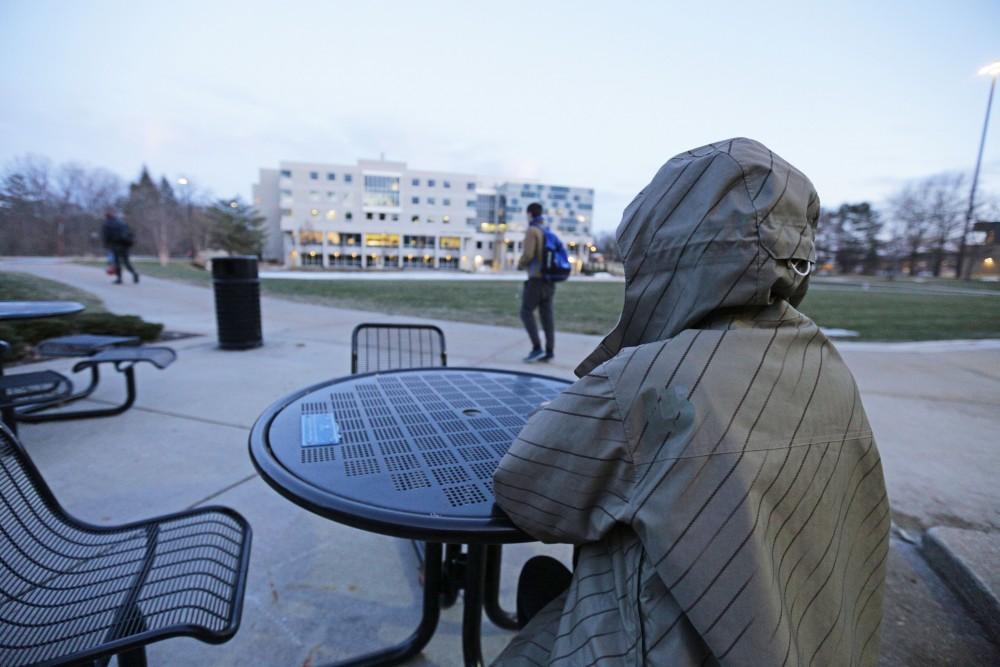Combating freshman loneliness on campus

GVL / Emily Frye GVSU student sits alone outside of Kirkhof center on Wednesday January 24, 2018.
Jan 25, 2018
“Freshman loneliness” is not an uncommon problem, yet it is one that students often feel is exclusive to themselves. There are many factors that play into making the first year of college difficult for new students, and while Grand Valley State University offers plenty of resources for freshmen, most—if not all of them—depend on the student reaching out, which can be intimidating.
“I think so far the toughest part about it (coming to college) is having to do everything on your own,” said GVSU freshman Alexis Spathelf. “You are independent in whatever you do; you are responsible for everything. I think that also, not being able to have your parents or your siblings right there whenever you need them, that’s also kind of difficult sometimes.”
The University Counseling Center in particular offers many resources for students, one line of support being group counseling. Mark Sampson, associate director and clinical director of the Counseling Center, expressed that freshman loneliness is something he sees frequently.
“It’s very common, and what a lot of people think is the people that are farthest away have the biggest problem with loneliness, and it’s actually not so much,” Sampson said. “It depends on if they stay on campus or go home. It tends to be the people that live close. Weekends come (and) they go home a lot, and so while everyone else is meeting people, they’re going home. … They show up (at) mid-semester like, ‘I never met anybody.’”
The first semester of every academic year, the Counseling Center hosts a freshman conversation group—or an adjustment group—for incoming freshmen. This group meets again mid-semester for students who haven’t entirely adapted to life on campus.
“People are always saying, ‘Join clubs,’ and that doesn’t work for everybody,” Sampson said. “If you’re extroverted, fine, but if you’re more introverted and want to meet people, that’s the last thing you want to hear. What I always say is ‘Just make yourself available.’”
Spathelf said one way she has adjusted to life at GVSU is by spending time hanging out in the lobby of her dorm and meeting new people, something she really enjoys doing.
“I’ve met a lot of people in my dorm, so we always hang out every night in the lobby, so I’m always out there for like hours on end,” she said. “Besides that, (I) just spend time with new people, have fun (and) hang out with friends.”
The people who choose not to put themselves “out there” tend to be the ones who have the problem with loneliness, according to Sampson. Because of this self-isolation, these students also have the hardest time seeing how common this problem actually is, leading them to withdraw even more.
“If you have somebody who is going through the same things as you, it’s easier to see that you’re not alone and that you can talk to other people,” Spathelf said. “You can have another person to talk to and look out for.”
On the academic end, Sampson said one of the reasons freshman students get in the habit of missing classes (and subsequently dropping classes) is because there is no accountability.
“Once they miss one class, it’s easier to miss two, which makes it harder to go back to the third one,” he said. He believes this problem can be solved in part by faculty and staff members reaching out to these students.
“We tend to think people will reach out if they have a problem, and if you’re sitting there thinking you’re the only one that’s having a hard time, you’re going to internalize it and you’re not going to reach out,” Sampson said. “So it’s really important for people to check in with them—‘How are you doing?’—and to kind of open up that discussion. … Everybody thinks they’re the only one, and they’re not.”

























